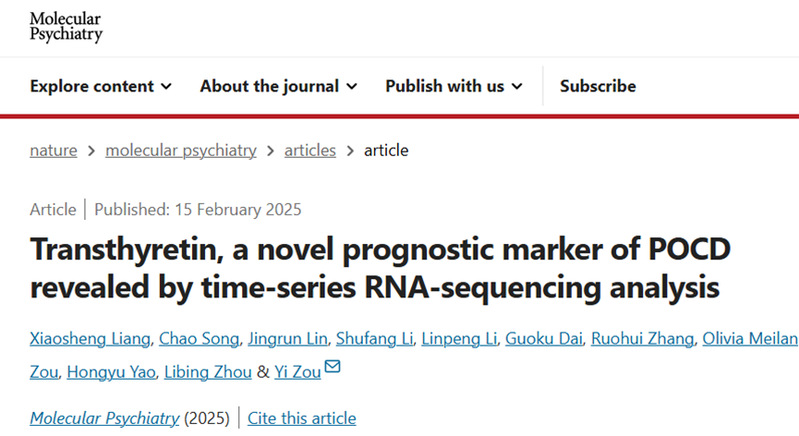- ABOUT JNU
- ADMISSION
-
ACADEMICS
- Schools and Colleges
-
Departments and Programs
- Arts College of
- Chinese Language and Culture College of
- Economics College of
- Electrical and Information Engineering College of
- Foreign Studies College of
- Information Science and Technology College of
- Environment School of
- Humanities School of
- International Business School
- International Studies School of
- Journalism and Communication College of
- Law School
- Liberal Arts College of
- Life Science and Technology College of
- Management School of
- Marxism School of
- Medicine School of
- Pharmacy College of
- Physical Education School of
- Science and Engineering College of
- Shenzhen Tourism College
- Research Institute
- Research Center
- Programs in English
- Majors
- Study Abroad
- Online Learning
- RESEARCH
- CAMPUS LIFE
- JOIN US
Latest News
Breakthrough in Postoperative Cognitive Dysfunction Research by Jinan University Team
Publisher: China Science Net (www.kxwq.cn)
Date: March 13, 2025
A research team led by Professor Zou Yi from the College of Life Science and Technology at Jinan University has achieved a significant breakthrough in the study of postoperative cognitive dysfunction (POCD). Funded by key research and development projects from Guangdong Province and the Guangdong Natural Science Foundation, the team has identified new biomarkers that could aid in the early diagnosis and intervention of POCD. Their findings were recently published in the journal Molecular Psychiatry.

(Screenshot of the paper)
Key Findings
Postoperative cognitive dysfunction is characterized by a decline in cognitive function that can persist for months or longer after surgery. The diagnosis of POCD has been complicated by variations in testing methods, cutoff values, and assessment timing. While certain markers of neuroinflammation have been linked to an increased risk of POCD, many of these markers are non-specific, making them unsuitable for definitive diagnosis.
In this study, the researchers identified transthyretin (Ttr) as a promising biomarker for POCD through time-series analysis of the transcriptomes and proteomes of the hippocampi in POCD mice. They discovered that Ttr levels were significantly lower in both the peripheral circulation and the hippocampi of mice diagnosed with POCD compared to those without the condition, across all time points post-surgery.
Furthermore, in human patients experiencing delayed neurocognitive recovery, Ttr levels were also found to be reduced 24 hours after abdominal surgery compared to those without such recovery.
Mechanistic Insights
The study confirmed the endogenous expression of Ttr in microglial cells, both in vitro and in vivo. In vitro assays suggested that Ttr may play a protective role by reducing LPS-induced microglial priming and supporting the differentiation of oligodendrocyte progenitor cells (OPCs) in a pro-inflammatory environment. This mechanism is crucial in understanding the pathological progression of POCD.
Implications for Future Research
The findings indicate that the conversion of thyroid hormone proteins is linked to the onset and progression of POCD, positioning Ttr as a potential biomarker for diagnosis and prognosis. This research opens new avenues for early diagnosis and intervention strategies for POCD, though further investigation into the specific mechanisms is warranted.
The ultimate goal is to develop targeted therapies that improve outcomes for patients suffering from postoperative cognitive dysfunction, providing a more comprehensive diagnostic framework and personalized treatment plans for clinical practice.
For more detailed information, the related paper can be accessed
(https://www.nature.com/articles/s41380-025-02918-0).
NEWS
- About the University
- Quick Links
Copyright © 2016 Jinan University. All Rights Reserved.




